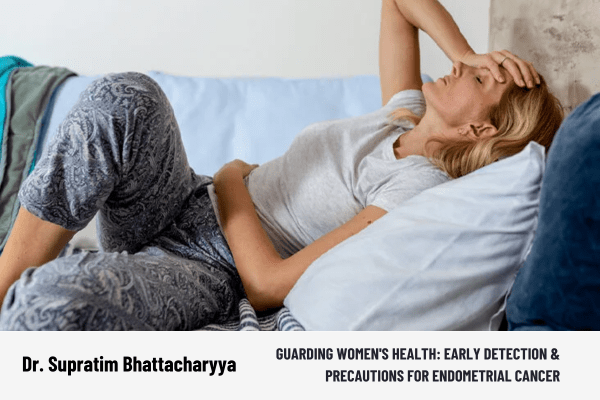Endometrial cancer is a significant health concern for women worldwide, but the good news is that early detection and precautionary measures can make a substantial difference in outcomes. In this blog, we’ll delve into the importance of early detection and explore some possible precautions to reduce the risk of endometrial cancer.
Early Detection:
- Regular Check-ups: Regular gynecological check-ups are essential. Your healthcare provider can monitor your reproductive health and detect any abnormalities early on.
- Listen to Your Body: Pay attention to any unusual symptoms such as abnormal vaginal bleeding, pelvic pain, or changes in your menstrual cycle. These could be warning signs of endometrial cancer.
- Screening Tests: Some women, especially those with certain risk factors, may benefit from screening tests like transvaginal ultrasound or endometrial biopsy. Discuss these options with your healthcare provider.
- Know Your Risk Factors: Understanding your risk factors, including obesity, hormonal imbalances, and family history, can help you and your doctor make informed decisions about prevention and early detection.
Possible Precautions:
- Maintain a Healthy Weight: Obesity is a significant risk factor for endometrial cancer. Aim to maintain a healthy weight through a balanced diet and regular physical activity.
- Hormone Replacement Therapy (HRT): If you’re considering HRT to manage menopausal symptoms, discuss the risks and benefits with your doctor. HRT can impact endometrial cancer risk.
- Oral Contraceptives: Birth control pills can reduce the risk of endometrial cancer. Talk to your healthcare provider about suitable contraceptive options for you.
- Dietary Choices: A diet rich in fruits, vegetables, and whole grains may help lower your risk. Antioxidants and fiber in these foods can be protective.
- Limit Alcohol Consumption: Excessive alcohol intake has been linked to an increased risk of endometrial cancer. Moderation is key.
- Quit Smoking: Smoking is a risk factor for many cancers, including endometrial cancer. Seek support to quit if you smoke.
In conclusion, early detection and precautionary measures are vital in the fight against endometrial cancer. Regular check-ups, awareness of symptoms, and addressing risk factors can significantly improve outcomes. By taking proactive steps and working closely with your healthcare provider, you can reduce your risk and ensure early detection if necessary, ultimately enhancing your chances of a healthier, cancer-free future.

